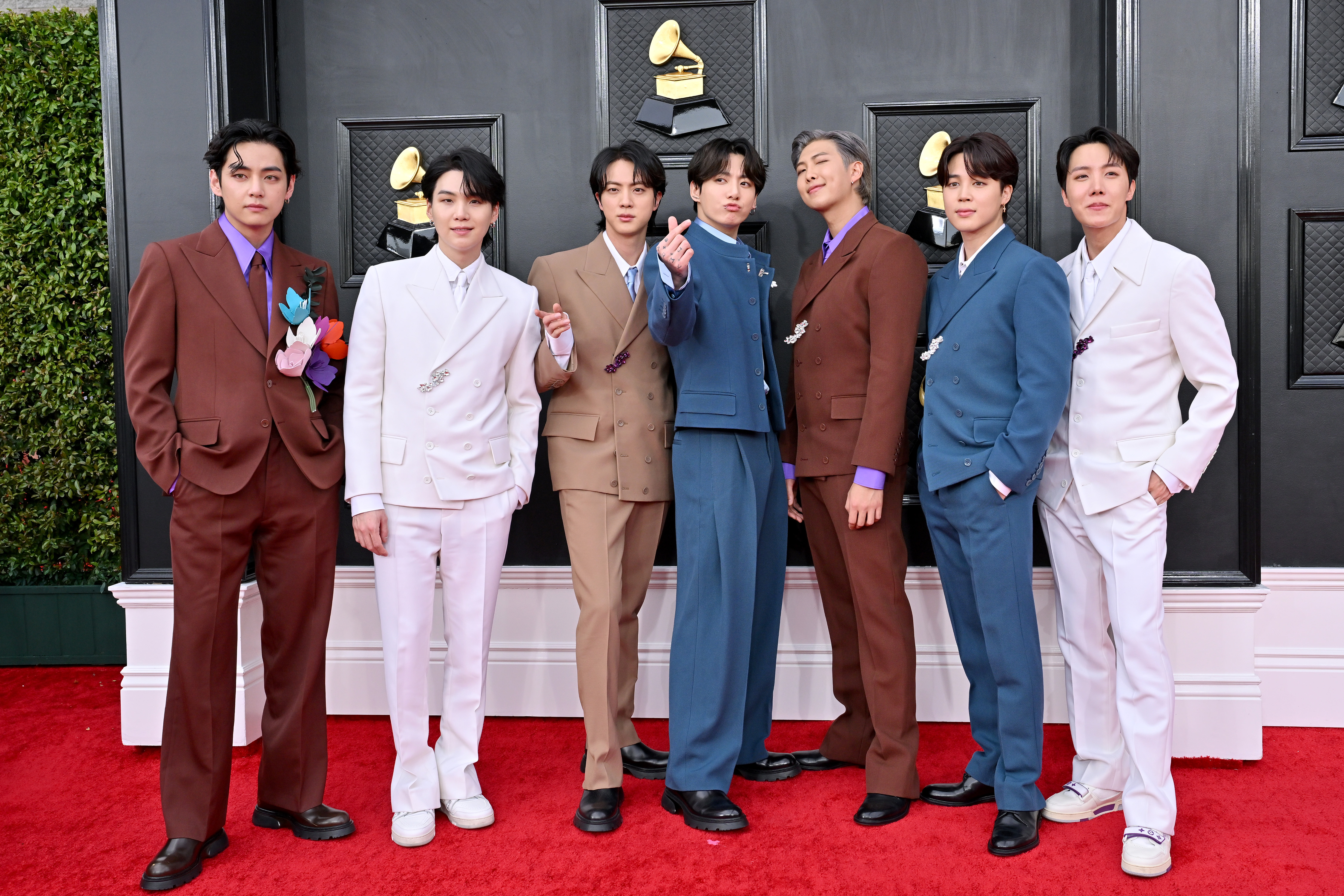
The Rise of K-Pop: How Korean Music Is Captivating Audiences Worldwide
From stadium-filling supergroups to animated blockbusters dominating streaming charts, the global thirst for K-pop is reshaping entertainment in ways few could have predicted — and its influence is only growing stronger.
The global fascination with K-pop continues to surge, as international audiences increasingly gravitate toward the genre's infectious melodies, polished performances and dynamic storytelling. Today, the impact goes beyond chart-topping girl and boy groups — it has expanded into film, television and global pop culture, underscoring the genre's unstoppable momentum.
Even Netflix has felt the power of this movement with the massive success of "K-Pop Demon Hunters," a hit animated film that has captivated viewers around the world.

V, Suga, Jin, Jungkook, RM, Jimin and J-Hope of BTS attends the 64th Annual GRAMMY Awards at MGM Grand Garden Arena on April 03, 2022 in Las Vegas, Nevada. | Source: Getty Images
Western Artists Now Chase the Power of K-Pop Fandoms
What was once an industry effort to break into Western markets has transformed into something much bigger: Western artists are now the ones seeking K-pop collaborations. These strategic partnerships give global stars access to one of the most powerful assets in music today — the K-pop fandom.
K-pop fans, known for their unrivaled dedication, coordinated streaming parties and promotional efforts, have become an influential force capable of pushing songs to the top of global charts.
For Western artists, tapping into these highly organized fan bases means expanding their reach, strengthening social media traction and boosting music sales across continents.
At the same time, K-pop artists benefit from these collaborations by entering new musical spaces such as R&B and hip hop, widening their audience and showcasing the genre's incredible versatility.
From BTS and Blackpink to a Blockbuster Hit
The cross-cultural exchange between K-pop and Western pop culture began with major acts like BTS, Blackpink, Seventeen and Twice. Their global popularity paved the way for deeper collaborations and a broader international embrace of Korean entertainment.
Now, that influence is spilling over into film.
Netflix's "K-Pop Demon Hunters" has emerged as a cultural phenomenon, impressing audiences far beyond the expected younger demographic. With a chart-topping soundtrack and high-caliber vocal performances, the movie showcases just how seamlessly Korean music and storytelling can captivate global viewers.
A Film That Celebrates Korean Culture Without Compromise
Part of the film's success lies in its unapologetic embrace of Korean identity. The animated feature follows a K-pop girl group tasked with saving their fans from demons who take the shape of a rival boy band — a storyline that blends fantasy, humor and music in a uniquely Korean way.
The movie does not dilute its cultural elements for international audiences. As Boston University associate professor of Korean and Comparative Literature Yoon Sung Yang put it, the film showcases Korean culture without "watering it down for a Western audience."
That authenticity has resonated strongly. The film has become Netflix's most-viewed movie of all time, surprising many adult viewers who did not expect an animated project to deliver such depth, charm and musical excellence.

Rei Ami, Ejae, and Audrey Nuna of "K-Pop Demon Hunters" pose with host Jimmy Fallon and their platinum record on Tuesday, October 7, 2025. | Source: Getty Images
What's Next for K-Pop's Global Influence?
With K-pop's popularity continuing to rise, the world can expect even more cross-cultural collaborations, expanded film and TV projects, and perhaps even a part two of "K-Pop Demon Hunters." The genre's global reach shows no signs of slowing, and its cultural impact is becoming more profound with each new release.
This ongoing exchange not only strengthens K-pop's presence worldwide but also offers Western artists access to new, passionate fan bases. As the movement continues to evolve, one thing is clear: K-pop's influence is no longer just a trend — it's a global cultural force reshaping the future of entertainment.